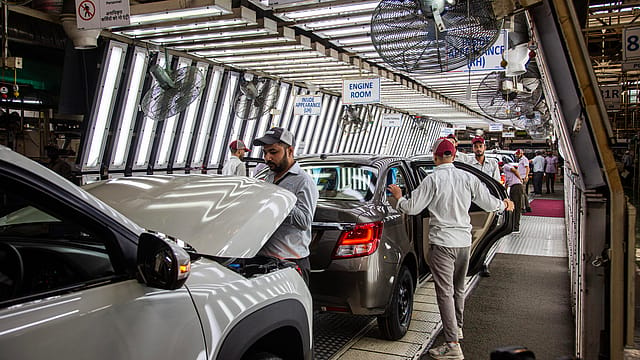Auto sales jump 19% in festive season; price hikes in the offing
ADVERTISEMENT

Automobile retail sales during the 42-day festive period this year jumped 19% to hit a new milestone of 37.93 lakh units as against 31.95 lakh units in the same period last year, according to the Federation of Automobile Dealers Associations (FADA).
The 42-day festive period of 2023-24 started on 1st day of Navratri (October 15) and ended 15 days post Dhanteras (November 10). "Significant growth was observed in the two-wheeler, three-wheeler, commercial vehicles and passenger vehicles, with respective rises of 21%, 41%, 8%, and 10%," says FADA president Manish Raj Singhania.
However, the tractor segment experienced a slight decline of 0.5%.
Record-breaking sales were reported in several categories, with rural areas particularly contributing to the surge in two-wheeler purchases, Singhania says.
"Despite initial underperformance during Navratri, particularly in the passenger vehicle sector, the situation improved by Deepawali, ending with a 10% growth rate," the FADA president says, adding that SUVs were the highest demanded vehicles.
Singhania, however, cautions that inventory levels for passenger vehicles remain a significant concern as OEMs continue to push further dispatch thus keeping the inventory rate at near to all time high levels.
"Tractors, which saw an 8.3% decrease in sales during Navratri, made a remarkable recovery, ending the festive period with only a 0.5% decrease. This turnaround highlights the robust purchasing power in rural India," he says.
The pick-up comes after retail sales fell 7.73% year-on-year in October 2023 to 21,17,596 units amid the "inauspicious period of Shraddh" that affected the new purchases. This was mainly due to a 12.6% YoY drop in two-wheeler sales.
Several automakers on Monday announced their plans to raise prices by January 2024. India's largest carmaker, Maruti Suzuki India Ltd said it has planned to increase the prices of its cars in January 2024 on account of increased cost pressure driven by overall inflation and increased commodity prices. "While the company makes maximum efforts to reduce cost and offset the increase, it may have to pass on some increase to the market. This price increase shall vary across models," the carmaker says. It is yet to decide the quantum of hike across its various models.
Tata Motors too is mulling a price increase next year. "We are considering a price hike across our passenger and electric vehicles in January 2024. The extent of the hike and exact details will be announced in few weeks," a Tata Motors spokesperson said.
German luxury carmaker Audi said it will hike prices of its vehicles in India by up to 2% from January next year, citing rising input and operational costs. The price hike will be effective from January 1, 2024. "Achieving profitability through a sustainable business model remains a critical part of Audi India’s strategy, and we are committed to providing the best to our customers. Due to rising supply-chain-related input and operational costs, we have effected a price correction across our model range, maintaining the brand’s premium price positioning. The price correction aims to ensure sustainable growth for Audi India and our dealer partners, and we will ensure that the price hike's impact is as minimal as possible for customers," says Balbir Singh Dhillon, head of Audi India.